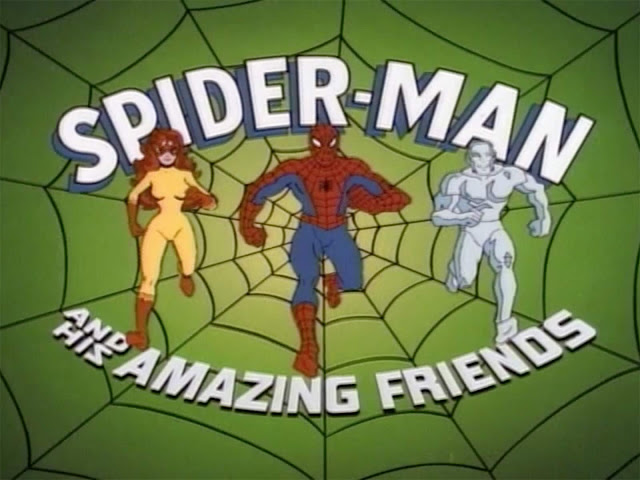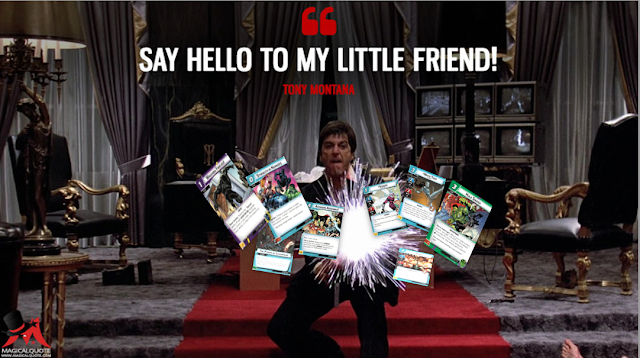In my last blog I teased that I'd finally found the solution to my Spider-Man woes. For those who didn't read it, I bemoaned the fact that Spidey was my favourite superhero as a kid but I just hadn't been able to find a deck that I enjoyed playing with him.
My three criteria for enjoying a deck were...
- I LIKE being proactive, doing lots of stuff and drawing lots of cards
- I LIKE having heroes whose abilities are unusual or unpredictable
- I LIKE beating the villain as quickly and effectively as possible
I'd tried several times but found that Spider-Man leaned so heavily into Protection and defensive play being his natural home that I just hadn't found a dynamic Spidey deck that I liked. And then, with my last desperate roll of the dice before putting Spidey away for good, I found a deck I had fun with.
It turns out that the missing ingredient... was friendship!
STRENGTH IN STRENGTH IN NUMBERS
I've already written about the Leadership event Strength In Numbers a couple of times. I find it an interesting one because it so often divides opinion with many players not really understanding the point of it (I was one of these people once) and other players who think it's completely amazing (I'm one of those people now).
My personal journey with Strength In Numbers began when I used it to solve my problem with Black Panther not being able to find both his suit pieces and Wakanda Forever quickly enough. After that I switched Wakanda Forever for Blaze of Glory and it became the engine behind my Ronan-beating Star-Lord rush deck.
Since then I've continued using Strength In Numbers in several decks, most notably in creating a Hulk deck that could actually smash things reliably, and then once we had the latest wave of Leadership cards I revisited the Black Panther deck and used it to fly through the Mad Titan's Shadow campaign unbeaten.
In short, I think Strength In Numbers is one of the strongest strategies in the game. I don't think it naturally suits every hero, but when your hero has the necessary ingredients you will struggle make a better deck through any other strategy, and even if your hero isn't a great fit for Strength In Numbers you can probably make it work. I've also found that heroes can fit into Strength In Numbers for different reasons - what Hulk or Spider-Man bring to the table is different to what Star-Lord or Black Panther bring, for instance. Better in some ways, worse in others, I've already been surprised a couple of times by how well Strength In Numbers works with somebody and I'm sure I've got more suprises ahead of me.
I think it's also very true that recent expansions have worked so well with Strength In Numbers that the archetype - which was already powerful before - has become INCREDIBLE. Compared to six months ago we've got some fantastic new allies who are cheap but help us draw more cards, more powerful resource generation and we even got some great new top-end toys that synergise with what we're already planning to do!
If you've not tried Strength In Numbers yet then I think the best way I can explain it to you is that it's a powerful engine that drives your deck forwards and accelerates everything you're doing. But like all engines it needs fuel to pump into it, and it also needs all that extra power it generates to be connected to something on the other end.
WHO IS STRENGTH IN NUMBERS GOOD FOR?
As much as I'm a massive fan of Strength In Numbers I don't think it's for everyone - not every hero fits the mold particularly easily. Through using Strength In Numbers across several different heroes I think I've come up with a good idea of the desirable traits a hero should look to have:
- Economy to play multiple allies quickly
- Able to keep allies alive
- Cost-effective big finishing blow
- Be an Avenger
It's not essential to have all of those traits, indeed arguably very few if any heroes have all of them, but the more your hero can lay claim to the better fit you're going to be for Strength In Numbers
Economy to play multiple allies quickly - Strength In Numbers works best when you've got 3+ allies in play so you need to be able to get to that point as quickly as possible. To me this makes burst economy like Vibranium, Limitless Strength or Star-Lord's What Could Go Wrong? ability much more valuable than the slow & steady economy you get from cards like Super-Soldier Serum, Helicarrier etc.
Able to keep allies alive - allies aren't cheap and you want lots of them in play. The best way to develop having 4 allies on the table instead of 2 is to avoid them dying all the time! This can take multiple forms: either having a hero who can useful defend villain attacks himself so he doesn't need allies to block for him, having effects that heal your allies so that they don't keep dying to consequential damage, or even giving your allies Tough if they're going to be fighting on your behalf.
Cost-effective big finishing blow - those first two points get you through the early game and into midgame, but for the endgame you really want something that is the reason why we're trying to draw lots of cards and get loads of resources for in the first place. You need the payoff! Wakanda Forever, Blaze of Glory, Avenger's Assemble, Hulk Smash... these are the big hits that are going to put the villain into the ground.
Be an Avenger - if you're not an Avenger this one is kind of a bummer, but there's no denying that it all gets a lot easier if you know the right people. Most of the best allies for Strength In Numbers are Avengers, and specifically in cards like Stinger, Avenger's Tower, Captain America (ally version) and Avengers Assemble there's extra support if you're part of the right team.
You *DON'T* have to tick all of these boxes, but the more you tick the better it gets I think, and there's some really good heroes that Strength In Numbers doesn't really help out at all.
AND FINALLY... HERE'S MY DECKS
I want to leave you by showing the four Strength In Numbers decks I'm actively using an explaining how they're each a little bit different...
You've already seen my Spider-Man version, and to an extent I think this one lies at one end of the Strength In Numbers spectrum because of the nature of what Spider-Man brings to the game. One of the biggest things Spidey brings to the deck is that he's good at defending his allies with his high DEF and he also draws a lot of cards naturally thanks to his Spider-Sense. The *downside* of this approach is that his damage output is actually pretty low as he's very often exhausted on his turn because he defended a villain's attack. Spidey is therefore quite a slow & steady version of the deck that's trying to keep a team of solid heroes in play for a longer period and really sweat them to do all the work with Mighty Avengers and Avengers Assemble. This actually also suits Spidey because part of his big output for Band Together is used Webbed Up to tie the villain down, or drawing cards to see Enhanced Spider-Sense as often as possible and control what is coming at you.
Interestingly, I think my Hulk deck is actually the one that's closest to Spider-Man in playstyle. Hulk was the hero who proved to me the value of having the hero do the hard defensive work and giving your allies time and space to build up, as with DEF 3 and a whopping health total Hulk can easily eat a bunch of villain attacks to the face. This means that Hulk is more interested than anyone else in getting the maximum 6 allies out at once (3 + Stinger + Triskelion + Avengers Tower) simply because he can actually soak the damage that lets you get there. However, unlike Spider-Man, Hulk doesn't have the control tools so he tends to do some pummelling along the way and eat into the villain's health total. He's not using Avenger's Assemble as a common play, he's really looking to get the villain into range for a massive 'Hulk Smash & Avengers Assemble' turn where you just obliterate the villain at once.
The latest version of my Black Panther deck switches roles a little bit - Black Panther *could* defend his allies if he wanted to, but he's not as good at it as either Hulk or Spidey so instead he lets his allies defend him a lot of the time. The big pivot here comes in bringing cards like Ready for Action and Rapid Response to keep allies on the table in a cost-effective way. What's missing, compared to Hulk & Spidey, is the need to really pump the allies up because once T'Challa gets his Black Panther suit rolling he can be drawing through his whole deck every couple of turns and shouting Wakanda Forever twice per turn tends to be all you really need out of life. The allies mix is a lot more defensive as a result - Mockingbird, Ironheart - as they're just buying you time to become the true king of Wakanda.
And finally, Star-Lord has been sitting on the naughty step ever since I decided he was just far too good to actually be fun, but he was one of my seminal Strength In Numbers decks. More than any of my other options, Star-Lord just brute forces the whole thing with his sickeningly powerful hero ability to reduce the cost of cards by 3, and a stack of amazingly good cards in his hero pool like Daring Escape, Star-Lord's Helmet and Sliding Shot. Oh, and Blaze of Glory as the kicker at the end. Star-Lord doesn't care about defending his allies, or even about keeping them alive... there's always going to be another one along next turn to replace them and they're basically all free because your hero effect is busted. None of the other Strength In Numbers decks can match Star-Lord for the raw economic power he brings to the table, and that means he can just plough into the villain head-on. It'll be ugly, but it'll also be over in three turns so who's counting?
=======































